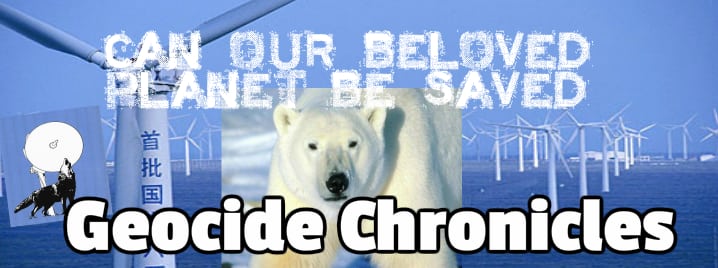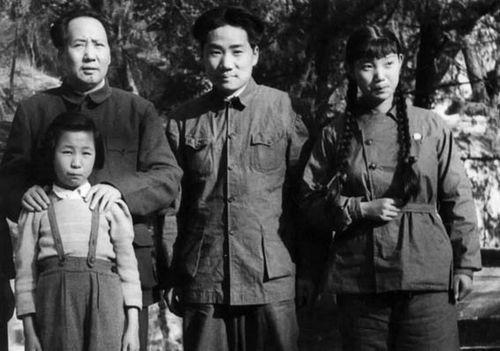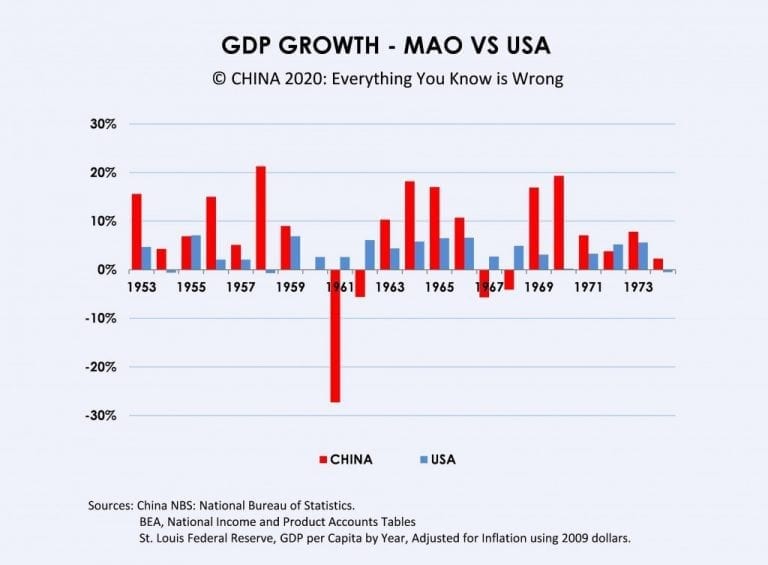(This is the final part in a 5-part series which examines the Russian Revolution and relies upon the new book A People’s History of the Russian Revolution.)
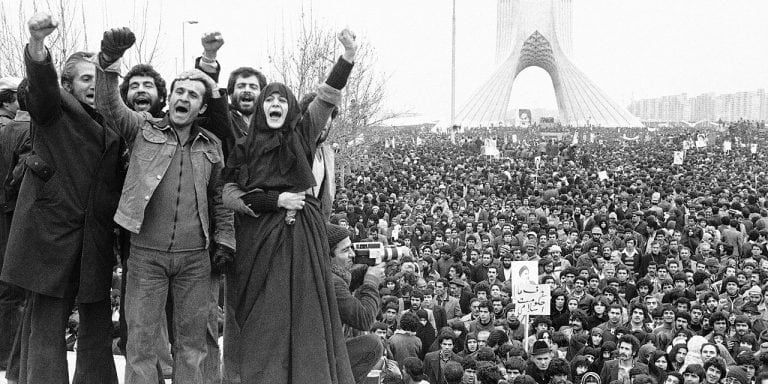
Iran has rectified the biggest error of the Russian Revolution by proving that socialism is undoubtedly compatible with religion.
The horrific persecution of religious people, the wholesale Bolshevik slaughter of clergy, the razing of churches, and their abominable intolerance of all religions was - in the least condemnatory terms - an unacceptable violation of both human rights and human nature itself.
Their foolish lumping together of religion along with capitalism and monarchy was a political catastrophe that enormously swelled right-wing reactionary forces, and directly provoked the rise of Mussolini in 1922, and then Hitler. Indeed, the USSR’s unprecedented total war on religion provided the single worst public relations failure in the fight against capitalism and bourgeois (West European) democracy.
What the Iranian Revolution of 1979 has done is to help reverse this enormous failure of 1917 Russia. Maybe one has to be a Muslim to see this clearly and without bias, but Iran has proven more than any other nation in modern history that religion can play a positive role, and even a principal role, in pushing society towards economic and democratic socialism.
"...Islam, as I assume most everyone is aware, differs from its brother Christianity in that it does not believe in rendering to Caesar what belongs to Caesar if Caesar is unjust: throughout the Koran Muslims are specifically, repeatedly and categorically obligated to stand with the oppressed and to oppose tyranny."
Iran has done this more emphatically than in any Latin American country, where religion has also performed a very similar function in recent decades and where it will undoubtedly continue to do so. Indeed, anyone with any familiarity with Latin America would agree that it is absolutely unthinkable that leftism will progress there without the direct support of the Catholic Church and the myriad indigenous religions.
If Western leftists who detest religion could just take a clear-eyed look around, they would see that the leftist world has changed and it is they who are the outdated, reactionary extremists on this subject:
In the cloakroom of the Museum of the Revolution in Havana there is an easily-visible posted note from the Pope discouraging theft - that is not irony, but progress; Vietnam’s constitution has always recognized religion and a 2003 Communist Party resolution strengthened religious protections; China has given up their war on their religious culture and is promoting neo-neo-Confucianism (which has a cosmology and thus is definitely a religion, even if it is not one easily understandable in the usual terms of the Abrahamic faiths).
The jury is in and there is no longer any question: Socialists no longer hate religion, only extremists do. Certainly, only extremists deny other people the right to their chosen faith!
So in 2017 Iranian “fundamentalism” is looking simply “fundamental”…to Iran’s essentially unparalleled human progress since the end of the Iran-Iraq War: from the period 1990-2014 only capitalist/longtime military dictatorship/US-occupied South Korea had a bigger increase in their UN Human Development Index than Iran…and there is no economic blockade on South Korea.
The Western left’s “Iranian blinders” never cease to amaze me: Even true leftists in the West never seem to ask themselves why the same countries, cultures & ideologies who committed near-total cold war against the USSR and socialist countries are…also committing near-total, cold war against Iran!
LOL, it's as if such leftists think this is some sort of unrelated coincidence! But it’s really because their anti-religion (and thus anti-democratic) and ethnocentric tendencies are so domineering that they cannot see Iran’s contribution to mankind’s modern democratic progress clearly.
But the Western left’s hatred of religion is outdated even within their own societies: with a few exceptions (Italy, Spain, Poland, etc.) I doubt many people in Europe believe that their churches play any real role in their national politics anymore? This makes their anti-religion attitude even more unnecessary, and twists it into the obsessive vigilance of a fanatic.
The ideological similarities between 1917 Russia and 1979 Iran are obvious to anyone: Anti-monarchism, anti-bourgeois (West European) democracy, anti-capitalism, anti-imperialism, support for liberation movements, anti-centralization, pro-economic equality, gender equality (an undoubtable success in Iran which is both statistically and culturally verifiable, but like all cultural issues parts of this must be viewed within the Iranian context and not a foreign, externally-imposed, “Amsterdam” version), explicit rights for minorities, respect for minority cultures, and on and on and on.
That’s almost 10 pretty darn fundamental socialist concepts which Iranians openly pursue and advocate…and that’s off the top of my head.
But we couldn’t have done it without the Russian Revolution first lighting the way - even if they got lost in the end.
The religious basis of opposing capitalism and imperialism
“The Bolshevik policy was simple: with the exploited against the exploiter, with the oppressed against the oppressor; above all, opposition to the dominant great Russian chauvinism of the Tsarist State.”
That quote is from A People’s History of the Russian Revolution, a new book on which this 5-part series is based. I think it’s going to be an important book because it shows how the leaders & political parties of the Russian Revolution were not as vital to the revolution’s success as much as the actions and efforts of the 99%. This glorification of the common man is always a necessary idea, especially on this centenary of the Russian Revolution.
But this article - the final in the series - is intended to show the links between 1917 Russia and 1979 Iran: to many people, and not just Iranians or Muslims, they are two inseparable links in the chain of human progress and political modernity.
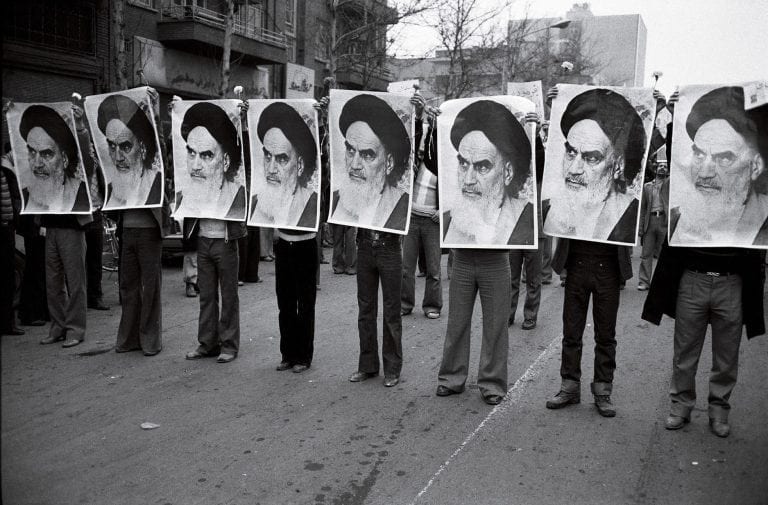
Young men proclaiming their allegiance to Imam Khomeini in 1978.
What should be notable in the former part of this quotation is its resemblance to the injunctions of jihad (war against sin) and Islamic teachings.
Islam, as I assume most everyone is aware, differs from its brother Christianity in that it does not believe in rendering to Caesar what belongs to Caesar if Caesar is unjust: throughout the Koran Muslims are specifically, repeatedly and categorically obligated to stand with the oppressed and to oppose tyranny. (It’s true that there is a widespread consensus that devotion to this idea is stronger in Shiite theology and culture, but that does not mean it is still not a key part of Sunni culture as well, especially when compared with Christianity.)
This is why any Muslim who learns about the moral injunctions and goals of socialism cannot help but be struck by many of their similarities with Islamic mores. LOL, this similarity is such a self-evident truth to Muslims – and often such a shocking revelation to Westerners – that I cannot help but be amused at the disparity between our cultural divides on this subject.
This is also why supporters of Iranian Islamic Socialism can honestly say that they are advocating both Islam and Marxism at the same time, whereas Westerner after Westerner has dogmatically insisted to me that I cannot be Marxist because I am also religious! After all these many years, all can say is: LOL! And then I point to Iran as proof that it IS indeed possible….
The inconsistencies, idiocies and inherited, illogical intolerances on this subject – this cultural chasm, this enormous divide in the perceptions of modern reality– is both so enormous and yet so insignificant that I am justified in ending this with a wave of my hand.
Sidebar: I included the latter part of the book’s quotation to bring up how Iran is the only regional country which incorporates and protects all of its minorities, and is obviously a huge advance from the Arab nationalism of Baathism. Iran is diametrically-opposed to the illegitimate state of Israel, and yet Iran protects the largest population of Jews in the Middle East outside of Israel. (Judaism is never Zionism, after all.) Iran may not be not tolerant of all groups, but Cuba doesn’t tolerate Jehovah’s Witnesses, the Vietnamese ban similarly disruptive missionary groups, I would not encourage Scientology to seek a foothold in China - these are exceptions which prove the rule of near-total tolerance of modern socialist nations.
The near-religious urgency of socialism - the religious urgency of Iranian Islamic Socialism
[dropcap]W[/dropcap]hat 1917, the eight decades of modern history which followed, and the failure of the pan-European project have all demonstrated is that the People only rule in an ideologically-correct, socialist-inspired system.
I can assume that the many proponents of West European (bourgeois) democracy are bristling at the phrase “ideologically-correct”. “What does he mean by that?! Where is his tolerance and doesn’t he realize that no ideology should be considered ‘correct’?!”
No, I don’t agree, and this is why Leftism is losing in the West: it tolerates that which wants to kill it.
Their bristling is their problem because they believe, falsely, in the complete relativism of all political issues. Many of them go even further, I believe, to the complete relativism of all moral issues.
This refusal to decide - this refusal to admit responsibility for anyone other than themselves and, perhaps (and only “perhaps”) their most immediate family - is a cultural dilemma which Western European societies have been unable to solve and which has produced their terrible model of governance that nobody wants to emulate anymore.
Indeed, as socialism’s model continues to succeed and impress (China and Iran being the two stars, currently), the Western model will continue to fall into disrepute…although it can be easily disputed that the Third World would have accepted only a small measure of the Western model if it hadn’t been forcibly imposed by colonialism. Regardless, this West European (bourgeois) model will be swept aside by their own People’s revolution, although they will probably be the last region to modernize.
The key to remember here is that Iran has already had theirs: Iran has declared illegal the privileges unique to the Greek island despot. (Indeed, this privilege was always, and thankfully, unknown to the plains farmer used to living harmoniously in a compact with the land and his neighbour in Russia, China, India and in many other places…but we cannot blame the Greeks for living in isolated, atypical, idyllic Greece. Western Europe must, however, finally modernize their political value system from that antiquated model.)
The book’s author understands this, and the necessity not of having choices - which the West hugely overvalues and falsely assumes that they actually possess - but of making definite choices:
“Politics has no real center-point, least of all in time of revolution. Every great question demanded a yes or no answer. Would the war be ended? Would the eight hour day be realized? Would the peasants get the land? Would the nationalities be granted autonomy? To each of these questions, the Provisional Government gave one answer and the masses another.”
The genius of the Iranian revolution was that it injected the urgency and faith-based stability provided by religious morality into these modern questions.
Indeed: God watches from all vantage points and at all times – one should not be permitted (or encouraged, as it often appears in the West) to choose immorally or anti-socially, and that definitely must go at the repository of all social power, collective unity, and socialist decision making: the ballot box. This combination of religion and democracy has been, few would object, most fully and most effectively realized in today’s Iran…and the results have been great for Iranians (and Palestinians, Syrians, Lebanese, etc.)
The Russian Revolution believed - in an egotistical Nietzschean fashion that was the trend at the time - that intellectual will is all that was needed to make moral choices. “Who needs a higher power? I am the highest power!”
Well, as Dostoyevsky and others proved: an over-estimation on the moral correctness of solely following one’s own will and will-to-power is quite dangerous for both the individual and society; the idea that humans will near-unfailingly choose the moral decision over the selfish decision without some sort of religious instruction or mandate is, it must be admitted, a historical aberration in human history. And the jury is in: the results have not been increased equality, peace, land and bread.
Frankly, it also remains to be seen if a modern education system - which necessarily promotes revolutionary democratic socialism and ardently dissuades from reactionary capitalism - can fully create this revolutionary fervour which demands correct behavior, immediately and permanently, without the moral imperative of religion? A society without any religious instruction is certainly another historical aberration.
Cuba, for example, has had the “advantage” of stimulating revolutionary fervor due to the decades of injustice which is atypically caused by living in an island under international blockade…but seemingly every household has either a Santeria shrine or a Catholic one, so it’s not as if religious instruction is absent – it is just not done at their schools.
Indeed, re-examining the utility of religion in the advance of socialism is something which the West and their leftists never even discuss informally, or even in formal educational settings!
What is clear is that religious righteousness was and is sufficient in Iran in order to produce the revolutionary fervor and stability which has produced a socialist, humane and modern society. It worked, and is still working thanks to this catalyst as you are reading this.
Disregard this section all you like, but on this issue there is no doubt: the repression of religion was the Achilles' heel of the Russian Revolution, while the promotion of religion in Iran (and elsewhere) has produced undeniably progressive results, proven by their sustained attacks on capitalist, monarchist, autocratic, neo-imperialist and reactionary forces.
The Russian clergy deserved to be faulted: why weren't they on the streets with the People?
[dropcap]F[/dropcap]irstly, Marxism doesn’t promote war on religion, but Russian Marxism did. LOL, the Russian Marxists made zero effort to win over the clergy to their side, such was their intolerance.
Why was this intolerance so absolute? The answer from the Russian Marxist seems clear: the clergy colluded with the 1% in order to preserve their special status.
That is not of interest in this article. What is of interest is this: You absolutely cannot make this claim against Iran's clergy in the creation of the Iranian Revolution.
This is such widespread knowledge that I don’t even need to support it with proofs. Iranian clergy were on the side of the Iranian People, taking the same risks and demanding the same political and economic modernity. They were not in their ivory tower, eating well and performing ceremonies while the People suffered, starved and took all the risks.
However, you can absolutely make this claim against the French clergy today.
In 8 years of covering hundreds and hundreds of public protests I have never, ever, never, ever seen a priest at a (even remotely) anti-capitalist (like anti-austerity) or anti-imperialist demonstration. The answer I get is: France has a strict (purely informal cultural) law which keeps religion out of politics and street demonstrations.
Absolutely not true: Then why do France’s clergy take part in anti-gay marriage demonstrations? This is obvious hypocrisy, and one thing we should definitely take from this is: France’s clergy participate when they feel like it. And they only feel like it when they want to serve the essence of a fake-leftist function: to give the appearance of moral virtue and modernity but actually propping up the establishment. Also, choosing to primarily get involved in order to participate in the trap of divisive identity politics inherent in modern bourgeois (West European) democracies.
But again, and like some in Latin America, Iran's clergy is fundamentally and repeatedly on the side of the People and true social righteousness.
It is incumbent on the Westerners to explain this reality for themselves: I do not have to try to explain the obviously superior political intelligence of the Iranian clergy. I certainly do not mean to sound superior here, but it is an objective fact that Iran’s revolutionary clerical leaders cannot be called fake-leftists.
The separation of church and state is a bourgeois-era concept (tap, tap - is this thing on?)
[dropcap]S[/dropcap]o many Western leftists do not seem to realize that their cherished separation of church and state is completely part of the dictates of bourgeois (West European) democracy! France’s influential law on secularity dates to 1905 – long before the Russian Revolution. The French Revolution’s, as important a step as it was, was a fundamentally bourgeois revolution, and not only because of its anti-Roman Catholic stance.
Indeed, if Western anti-religion leftists can sincerely take just one thing from this article – if they cannot possibly countenance the idea of Iran as a socialist or even remotely leftist culture – please realize that your adherence to secularism means you are adhering to a concept dating from the resolutely bourgeois era of European history: it is not modern.
The Russian Revolution made this same error.
Iranians, for cultural reasons I cannot take the time to explain here, are absolutely unable to follow this anti-religion path. Anyway, our rejection in 1979 of bourgeois (West European) democracy also forces us to reject this pat in desire for democratic modernity.
Therefore, the only question for Western leftists becomes: No matter what your bias is against religion, or Islam, or our ayatollahs - are you opposed to us having our own form of democracy?
Because mixing religion and politics in Iran is the result of an undoubtedly democratic consensus.
A recent and seemingly solid American university poll showed that 76% of Iranians answered “a lot” (47%) or “somewhat” (29%) to the following question, with only 6% answering “not at all”: “In your opinion, to what degree should our country's policymakers take religious teachings into account when they make decisions?”
76% is a landslide. But it’s actually more than a landslide, because we can also fairly add in the 16% who responded “not much”: when compared with a pro-secularity Westerner, “not much” translates into quite in favor of religion in government.
The reality is that 1917 Russia was probably the same way – it was just a supremely tiny minority who completely opposed religion in government.
Tragically, they thought they could change this near-universal fact of human nature simply by banning religion. They were totally wrong, because religion is no mere, short-term, fundamentally-empty “opium” in the slightest.
Western leftists compound this tragedy by refusing to learn the obvious lesson despite all the bloodbaths, sinning and political failure: people will pursue religion in their lives.
This may be your chance to leap ahead morally from 1917 Bolsheviks, just as they leapt ahead from the 1861 “emancipation of serfs is good enough” types: Now you may not pursue religion in your life, but if you fail to accept that others do…then you insist on being totally undemocratic on this issue.
What’s certain is that by making this your “identity issue”, you will continue - and you deserve to continue - to lose in your fight for leftism in your Western country.
Iran - decades after the Russian Revolution, far away, a different culture and society - did not make the same error: they chose democracy.
It is fair to say that Marxism is a religion; it is fair to say that all politics is religious
[dropcap]T[/dropcap]he ungenius of bourgeois (West European) democracy is encapsulated by the saying “politics is the art of compromise”.
For the religiously faithful: there can be no compromise with capitalism, colonialism, inequality, racism, Zionism, militarism, etc. To compromise on these issues is to put your soul, and other souls, at permanent risk.
In this world, what this bourgeois compromise translates into is: a compromise made among those within the 1%. It is rule by the gentry/aristocrat/technocrat. For them, the compromise between peasant and king is called “president”; for them the compromise between the emperor and the debt-slave is rule by “wealthy technocratic ministers”.
This is all immoral in 2017. It was not immoral to the brute caveman, or the feudal lord, or the Nietzschean Superman, but it is definitely immoral in 2017. For many in the West, it took the Great Recession to remind them of socialism, class warfare and the necessity of toeing the political hard-line.
Russia in 1917 needed no such reminding, but it does today. Iran, however, needs no such reminding, thankfully.
What Iran has done on behalf of the entire world is to demand that all religions no longer play a parasitic role – it cannot sit on the sidelines of human activity.
This was perhaps a vitally important and necessary step: Perhaps in the 19th/20th century Christian world their clergy truly was a hindrance to progress? Maybe, for reasons perhaps inherent in Christianity or perhaps not at all, Christianity had been an oppressive force even though true faith is indeed liberating?
In short, Iran’s continued success should force the West to fundamentally re-examine its very limited conception of the role religion can play in politics.
Iran has proved that clergy can be a politically – and not just morally – revitalizing force which protects the People and encourages the People’s progress, and not just the 1%. That’s a concept which the older generation in the West may not even want to consider, but the continued success of Iran means that younger generations will not be so close-minded: they will have to account for Iran’s stature as the only nation in the Muslim world which is not still a plaything of Western imperialism.
Again, in my visits to the 3rd World I hear respectful words for Iran again and again and again, while I hear only the contrary in the West (at least from White people). I hope the West comes around to Iran’s socialist success because they are really missing out, and shooting themselves in the foot by not learning from Iran’s success, and also by not supporting Iran.
The role of the People in 1917, 1979 and 2017 is the subject of the most honest histories
What followed 1917 in Russia is not the subject of this series.
Rest assured that if you are familiar with modern Iranian history, it was the same for the nascent Soviet state: international blockade, military intervention, the counter-revolutionary movement guided from abroad by traitors and chauvinistic foreigners, etc. Capitalist tactics do not change, nor can they if they aim to suppress socialism, democracy and modernity, wherever it may sprout.
A major reason that Iranian Islamic Socialism succeeded is that Iran benefited from the first steps and obvious mistakes of the Russian Revolution. Socialism was a new concept, and many changes needed to be made: indeed, the art of socialism is to be constantly changing, adapting, polling, voting, implementing, etc.
Iran was also a much, much richer country than 1917 war-torn Russia, and it was also richer than a Soviet economy which had been immediately devastated by Gorbachev’s perestroika – his unforgivable abrupt end to central planning of the economy (the “fatal error” of December 1987: to immediately cut to 50% from 100% all the products of industry), as well as the cultural upheaval caused by an unwanted unchaining of capitalist media, his declared end of the class war, his brutal abandonment of price subsidies and other measures which…keep a nation’s people from economic and spiritual (revolutionary) poverty.
What happened in Iran – the combination of religion and socialism - was indeed unprecedented, and violently opposed by foreigners, but it was not at Europe’s doorstep, like Russia.
And I don’t wonder why non-Muslim countries aren’t embracing Iranian Islamic Socialism for their own country – they aren’t Islamic. The war on Iran is far more motivated by the dictates of capitalism than the war for or against religion; all the West knows about Islam, and Iranian Islam, is that “it is not Christian”.
So Iran’s revolution isn’t exportable to Europe like in 1917 Russia…but it actually is, and in a far more benign way: ending the bourgeois, capitalist concept of strict secularity.
The term “Islamic Socialism” is quite a lot for some small Western minds to handle, both the “Islamic” and the “Socialism” part, LOL. Human progress assures me that Westerners will have to get used to it – thankfully, Iranians are well acquainted with it.
And I am certain that if the Arab world’s neo-colonial puppets are ever toppled, what their people will democratically install is their own national version of Islamic Socialism which is being modeled in a significant way (but not total) on the Iranian model.
It is no wonder why Iranians rejected bourgeois (West European) democracy - it is outdated and not even democracy. Everybody outside of the West sees that their legacy of centuries of blood and violence and that their so-called “postwar democracies” are simply selfish and corrupt capitalist aristocracies.
[dropcap]O[/dropcap]nly a few nations can claim to have actually picked up the torch of the 1917 Russian Revolution. China, Cuba, and Vietnam already had their revolutions; Burkina Faso was toppled in 1987 by France & the US; Venezuela has never had a revolution because they still keep playing by the rules and structures of bourgeois (West European) democracy; 2011 Egypt did the same as Venezuela and it turned out much worse, much faster; can you keep a straight face if you openly suggest that the post-Cold War pan-European project picked up the People’s torch?
Since the year 1979 almost nobody but Iran has dared to use the same methods - mass appropriation, mass redistribution, massive resistance on multiple fronts - which were employed by Russian socialists post-1917.
For those who want to learn more about Iran’s socialist methods post 1979, I encourage you to read this article I wrote: “Iran: Socialism’s ignored success story”. In short, I prove that Iran checks all the boxes of a socialist nation: An avant-garde party, central planning of the economy, control over the media, support for foreign liberation movements, empowering people via economic redistribution and democratization.
“But Iran is religious so it can’t be socialist yadda yadda yadda….” Yes, thanks for sharing that with me, but I have to wrap this series up.
This article was to make abundantly clear the obvious link between 1917 and 1979. The link is not perfect, because we are talking about two totally different cultures, but the bond which we can call “socialism” is a wonderful, justifiable fit.
Leftism, anti-capitalism, anti-imperialism, equality, democracy: Let’s now simply agree that all of these beautiful, necessary, peaceful ideas were present in both the 1917 Russian Revolution (excepting state-forced atheism) and the 1979 Iranian Revolution.
But Iran could never have done it without 1917!
And Iran has tried to, and will continue to try to, pay it forward: The capitalist war against Iranian Islamic Socialism has clearly failed to topple the revolution, and no amount of Trumpian rhetoric will ever make me believe that Iran can be toppled militarily – that was tried already, and it failed.
This means, if history is a guide, the world can look forward to decades and multiple generations of support for leftist ideas from Iran, just as the people of the USSR once provided the world.
Who’s ready for the upcoming Islamic Socialist century?! It will certainly happen in the Islamic part of the world, Inshallah. If the Islamic Socialist century is just a happy subset of the often-discussed Chinese Red Century”…why keep fighting the feelin’?
But, clearly, no hoped-for socialist century would have arrived anywhere without the sacrifices and successes of 1917 Russians. And so I wish a happy 100th birthday to the Russian Revolution, and extend my heartfelt thanks, as everyone should, and as history always will.
******************************************************
This is the final part in a 5-part series on the 1917 Russian Revolution which aims to put the role of the People first.
Here is the list of articles which were published, and I hope you will find them useful in your leftist struggle!
A People’s History of the Russian Revolution pits new scholarship vs. Mainstream Media
Who was not responsible for the Russian Revolution, and who was?
The fascinating People’s account of how the Russian Revolution was won at street level
Why anti-socialist talk about Lenin even more than socialists
Iran’s 1979 Revolution picked up the People’s torch first lit in 1917 Russia
All these articles can be found on this site, just do a search for "Ramin Mazaheri".

 From the cloud forests in the Andes to the indigenous territories in the headwaters of the Amazon, the Ecuadorean government has covertly granted these mining concessions to multinational mining companies from China, Australia, Canada, and Chile, amongst others.
From the cloud forests in the Andes to the indigenous territories in the headwaters of the Amazon, the Ecuadorean government has covertly granted these mining concessions to multinational mining companies from China, Australia, Canada, and Chile, amongst others. [dropcap]F[/dropcap]rom 2006, under the Correa-Glas administration, Ecuador contracted record levels of external debt for highway and hydroelectric dam infrastructure to subsidize mining. Foreign investments were guaranteed by a corporate friendly international arbitration system, facilitated by the World Bank which had earlier set the stage for the current calamity by funding mineralogical surveys of national parks and other protected areas and advising the administration on dismantling of laws and regulations protecting the environment.
[dropcap]F[/dropcap]rom 2006, under the Correa-Glas administration, Ecuador contracted record levels of external debt for highway and hydroelectric dam infrastructure to subsidize mining. Foreign investments were guaranteed by a corporate friendly international arbitration system, facilitated by the World Bank which had earlier set the stage for the current calamity by funding mineralogical surveys of national parks and other protected areas and advising the administration on dismantling of laws and regulations protecting the environment.